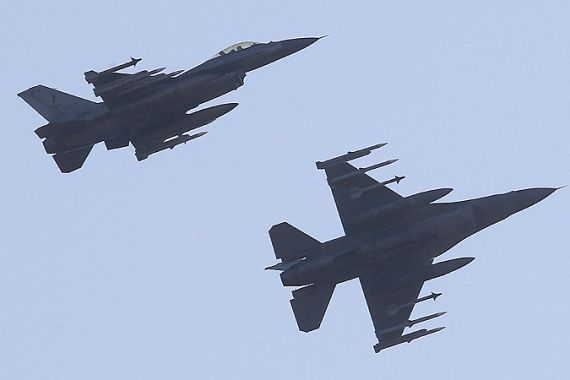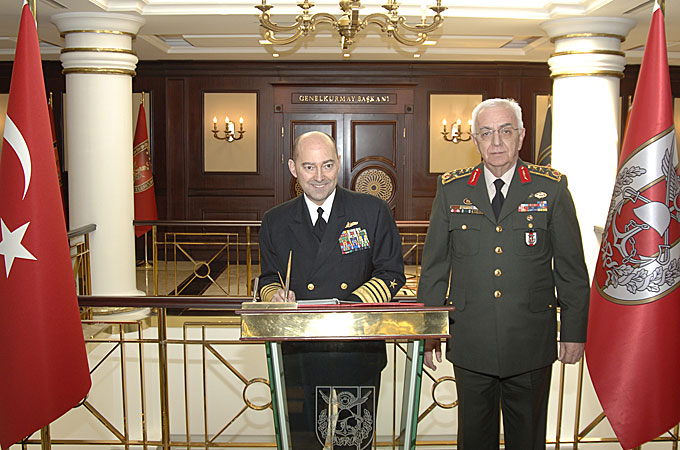NATO strives to end split over Libya command
NATO members still debating who should lead international intervention in Libya, with US keen to handover control.

 |
| Stavridis, left, is in Turkey in a bid to convince leaders there to back any agreement on NATO’s role in Libya [EPA] |
NATO members are continuing to debate who should lead the international intervention in Libya, with the US keen to hand over operational control to the military alliance.
As a NATO summit in Brussels entered its fourth day on Thursday, US admiral James Stavridis, the alliance’s overall commander, was in Turkey in a bid to convince leaders there to back any agreement on NATO’s role.
Turkey is helping to implement a naval blockade of Libya, but has expressed concern about the alliance taking over operational command of the no-fly zone from the US.
All 28 members of NATO must reach agreement before the alliance makes a decision about participating, and Turkey has so far rejected taking part unless it is given assurances that the operation will be limited to protecting civilians, enforcing an arms embargo and a no-fly zone, and providing humanitarian aid.
“It is a framework that is not offensive,” said Ahmet Davutoglu, Turkey’s foreign minister.
That framework would likely limit coalition air strikes on Gaddafi’s ground forces, which were crucial for the survival of Benghazi, the opposition’s eastern stronghold.
It would also preclude the bombing of military installations not connected to Libya’s air defences, such as naval bases, which have also been struck.
Turkey fears the repercussions of civilian casualties, said Al Jazeera’s Laurence Lee, reporting from Brussels.
Such an incident is far from unavoidable and the lessons of intervention in Kosovo hover in the background.
On April 14, 1999, NATO aircraft repeatedly bombed a convoy of refugees, many of them riding on tractors, killing 73 civilians and wounding 36 others on the road between the towns of Djakovica and Decane.
NATO pilots had apparently mistaken the convoy for a military one or had believed there were military vehicles in it.
“Now try and imagine what would happen if Turkey, as a member of NATO, was involved in a campaign over Libya and a similar a similar situation happened to a convoy of civilians outside Benghazi or Ajdabiya,” Lee said. “That’s exactly why they’re concerned.”
Stavridis met with Turkish military leaders in Ankara on Thursday, a day after holding talks with Davutoglu.
The Turkish foreign minister also spoke with NATO secretary-general Anders Fogh Rasmussen, US secretary of state Hillary Clinton and UK foreign minister William Hague on Wednesday night.
Critical voices
The need to forge a consensus on Libya that involves Turkey and retains Arab support becomes more critical each day, as the voices against foreign intervention grow louder.
Amr Moussa, the Arab League secretary-general, has already backtracked on support for the intervention, suggesting on Sunday it had gone beyond what the league approved before flip-flopping and throwing his support behind the action a day later in a meeting with Ban Ki-moon, the UN secretary-general .
The Arab League will meet for an emergency session on Tuesday, where its approval of the action and the participation of at least one member state, Qatar, will face a test.
London will host an international conference the same day to plot the way forward in Libya.
Hague said the conference will establish a “contact group” on Libya and assess the implementation of the Security Council resolution.
France has proposed an alternative arrangement to sole NATO control – the formation of a steering committee comprising foreign ministers from participating countries and including the Arab League.
That proposal has yet to receive either forceful support or dismissal.
Along with Turkey, Germany has also proven to be an obstacle to any agreement, abstaining from the UN Security Council vote that initially approved the no-fly zone and, on Wednesday, reportedly refusing to help enforce the international arms embargo on Libya.
US concerns
Washington remains eager to hand over command and control of the operation to allies, especially as international criticism grows.
Barack Obama, the US president, said on Monday that the transfer would take place “within days,” and Robert Gates, his defence secretary, has said he expects the US to begin scaling back its operations soon.
China, India and Russia, which all abstained from the Security Council vote, have repeatedly criticised the military action, and remaining in the lead role exposes the US to any disapproval.
China’s foreign ministry reiterated its call for a ceasefire on Thursday, warning that the conflict could escalate and “worsen the situation region-wide”.
“We believe that the objective of enforcing the UN Security Council resolution is to protect humanitarian [objectives] and not to create an even bigger humanitarian disaster,” spokesman Jiang Yu said.
The three nations, as well as South Africa and Brazil, are expected to raise their concerns at a Security Council meeting on Thursday, where Ban will deliver a briefing on the operation.
Jacob Zuma, the South African president, said his country “rejected any foreign intervention, whatever its form”.
Thought some observers thought South Africa would abstain at the Security Council last week, it voted in favour of resolution 1973.
In an interview on Thursday, Ban rejected concerns that the operation would stall or reach a quagmire.
“I think this is different than other situations,” he said. “I believe that the international coalition will have a successful operation.”